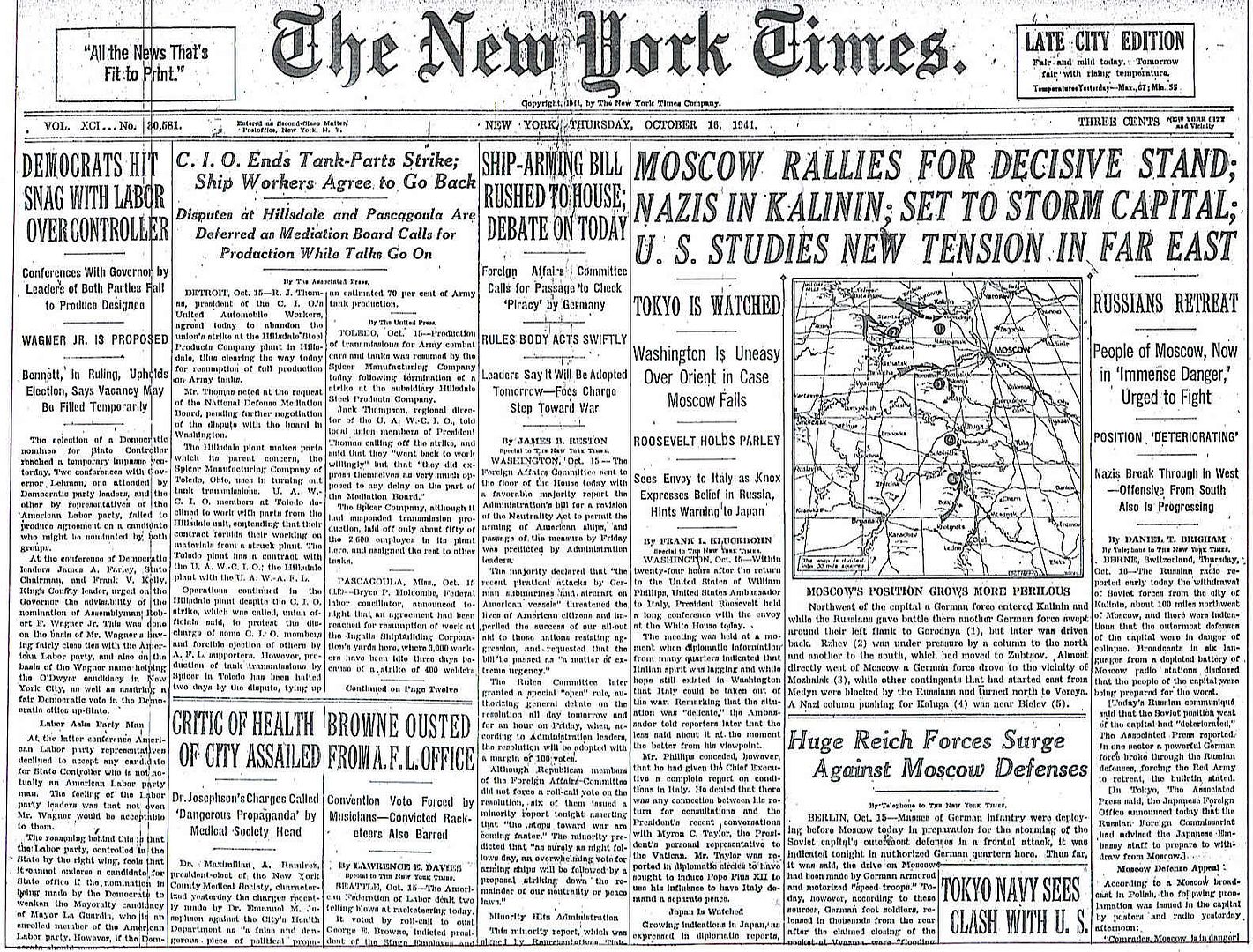
Posted on 10/16/2011 5:50:41 AM PDT by Homer_J_Simpson

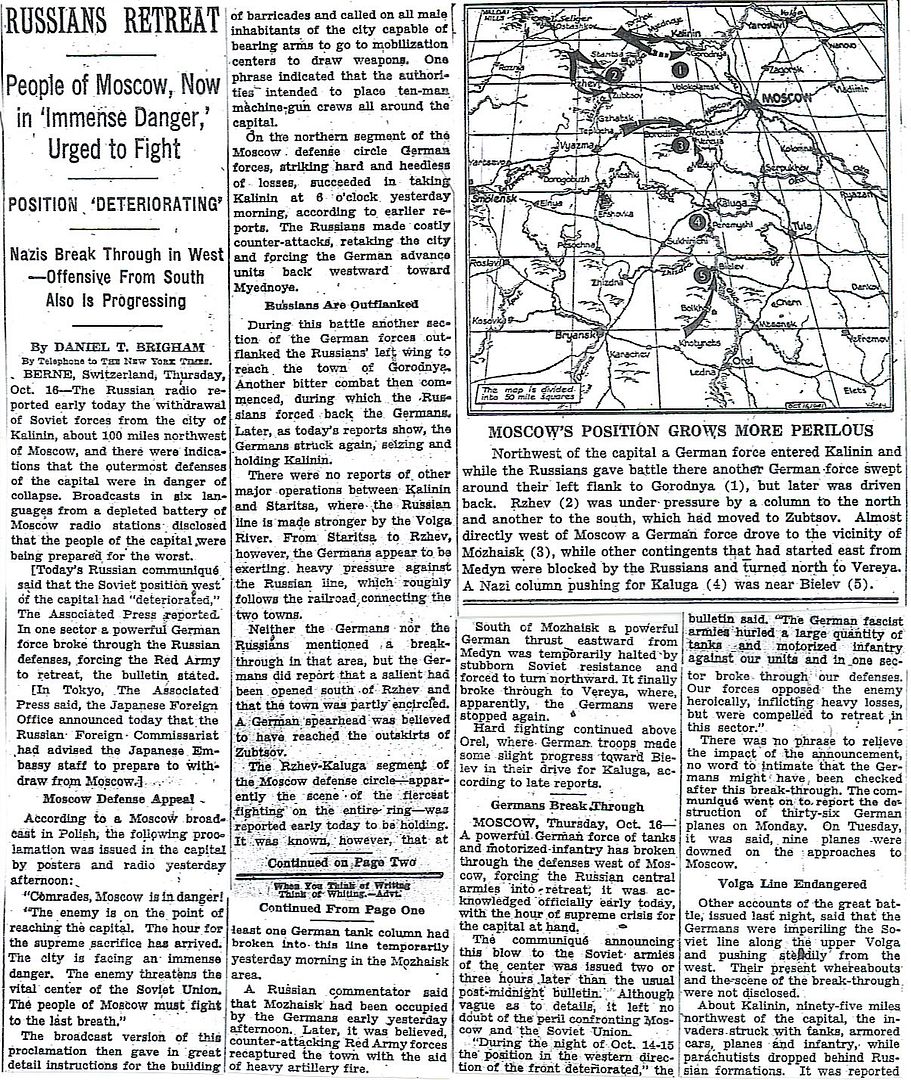
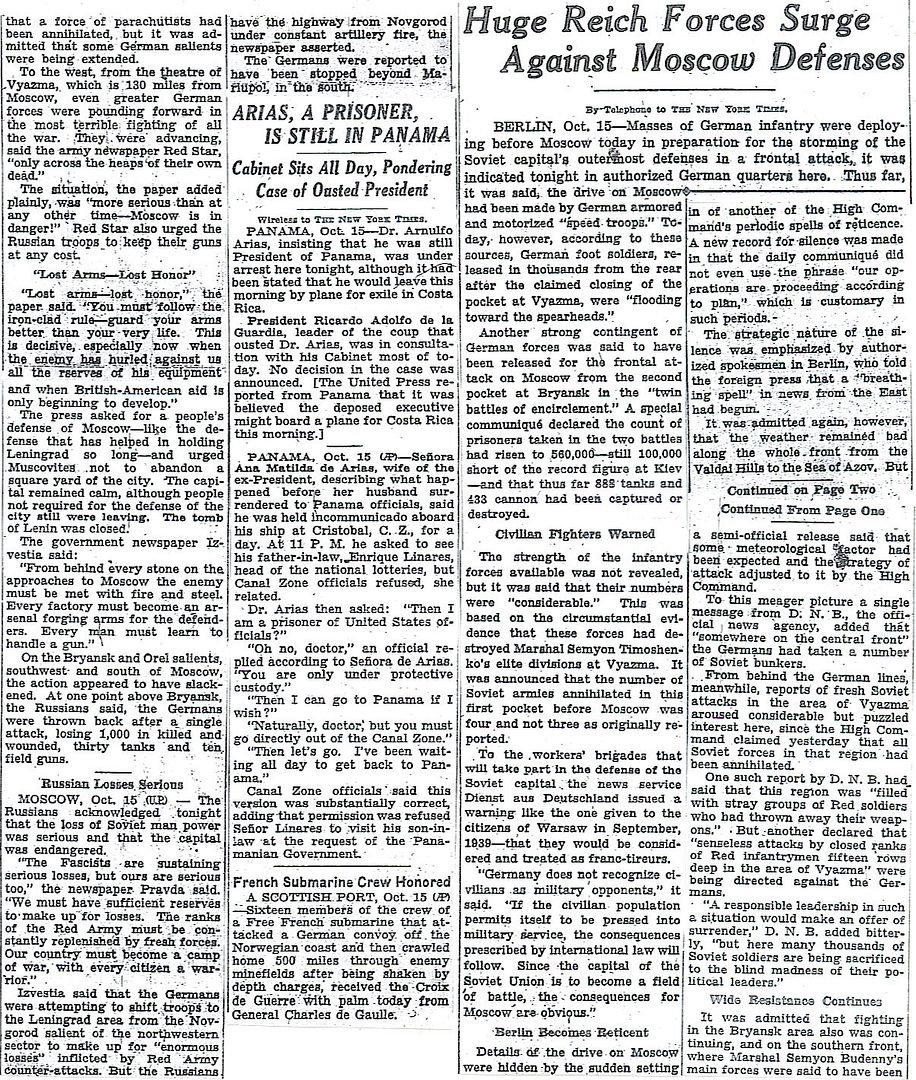
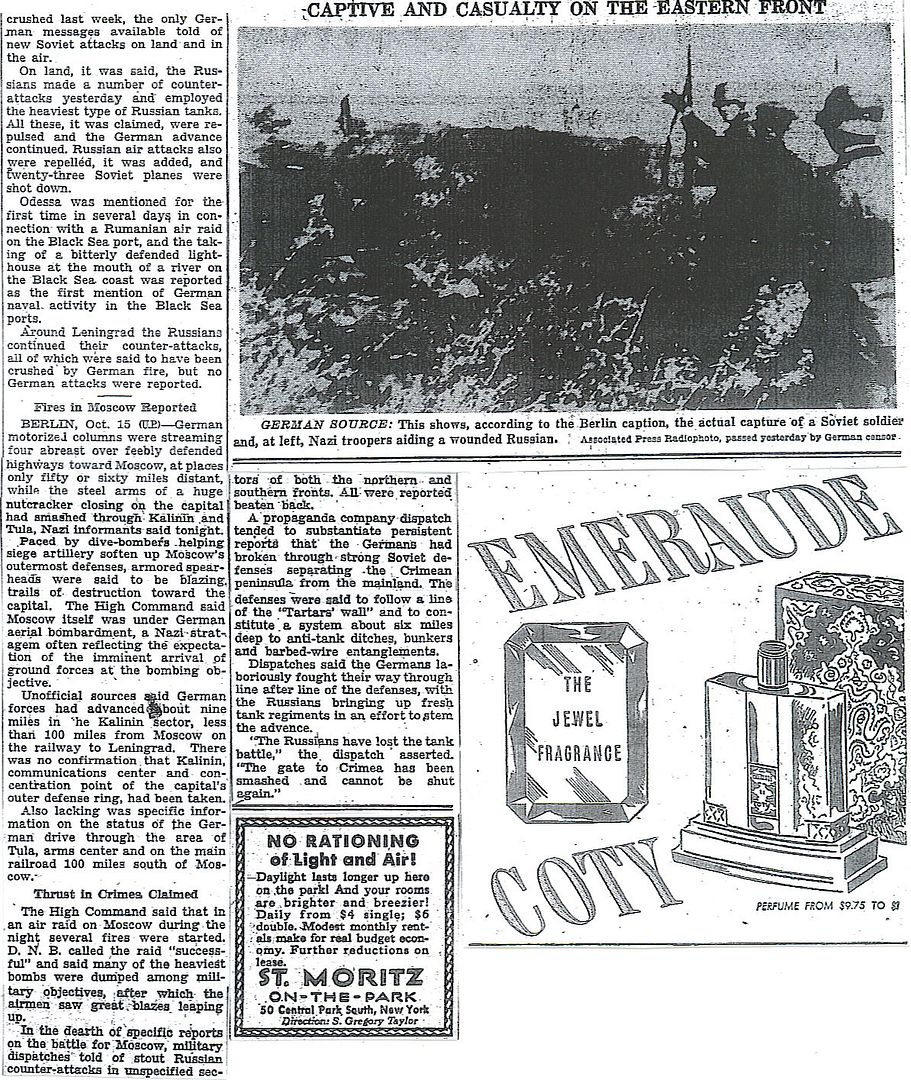
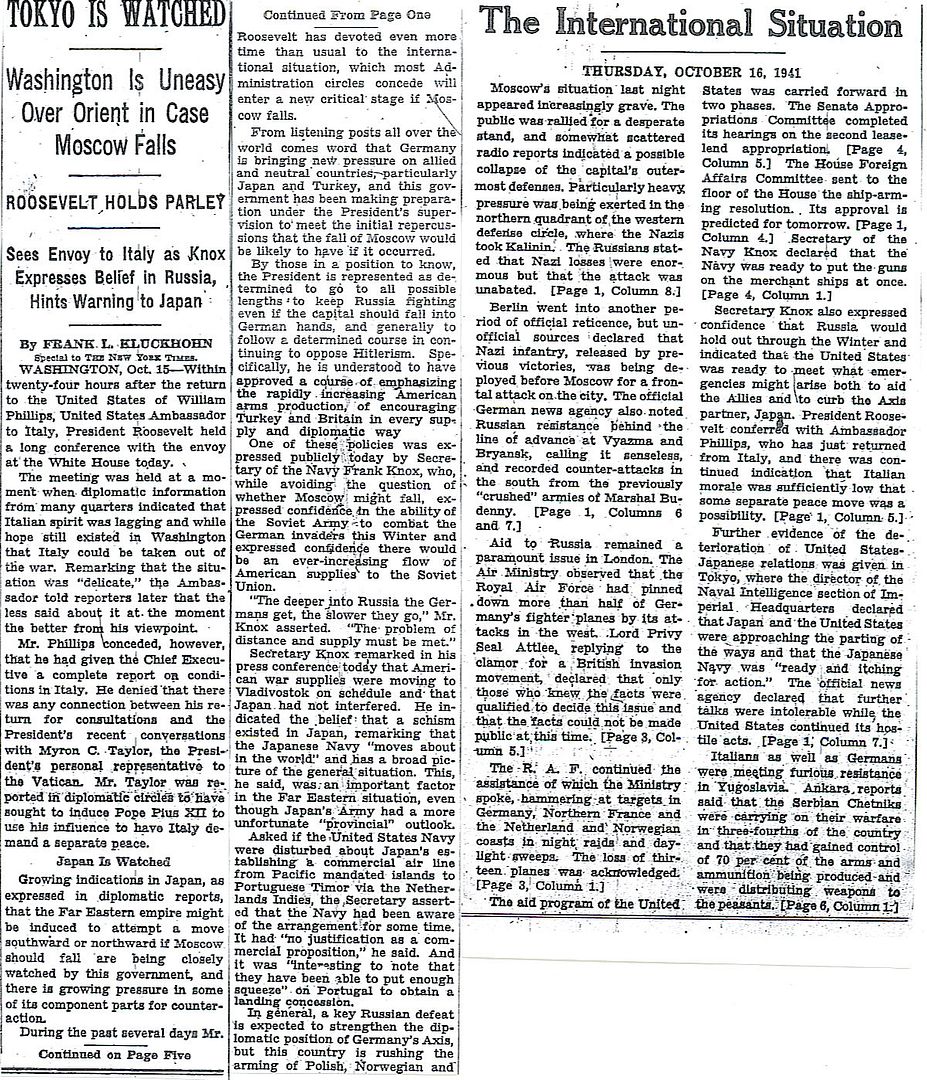
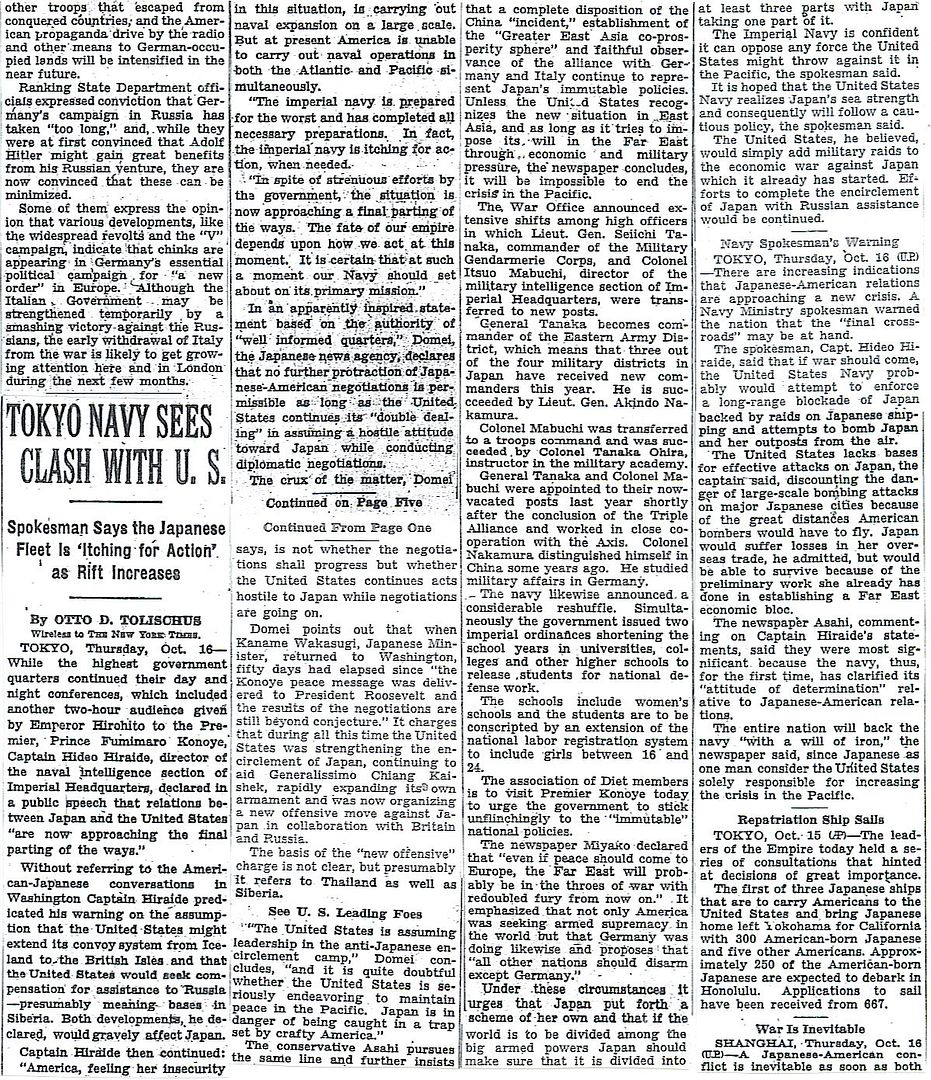
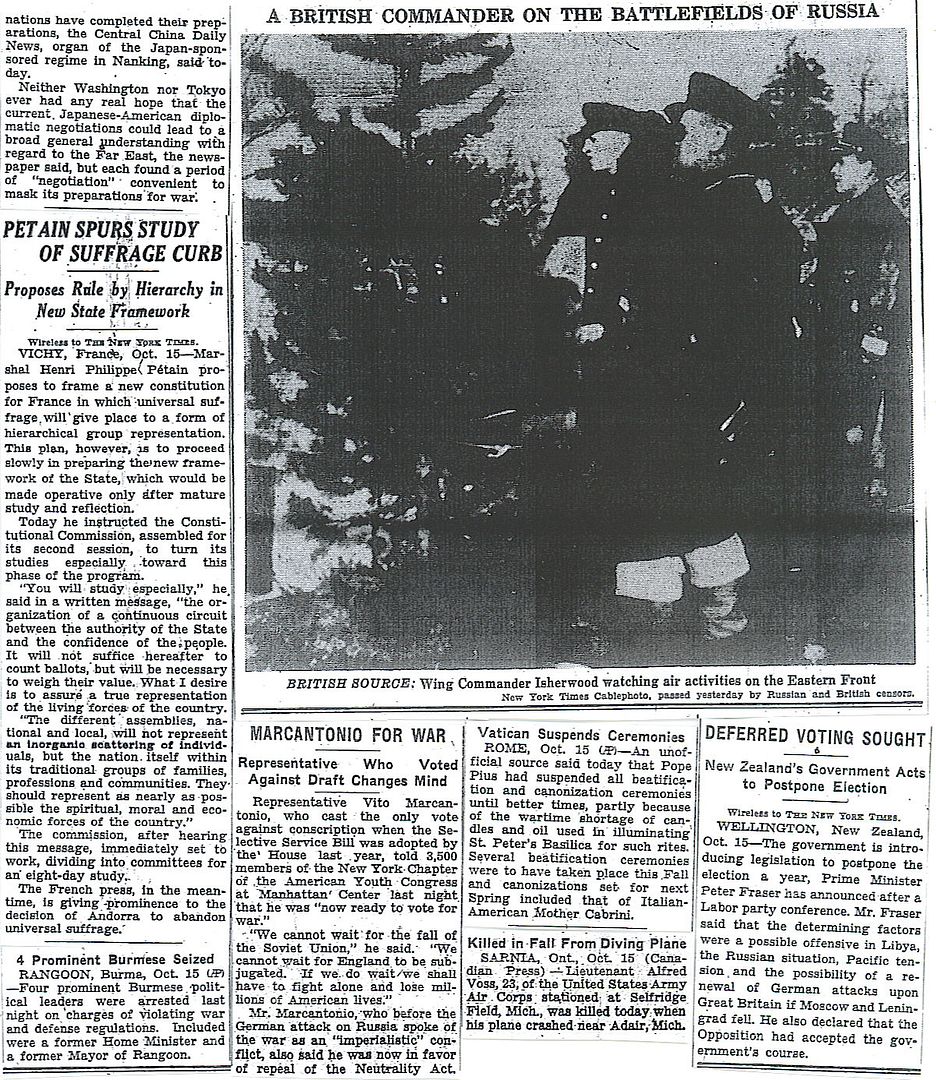
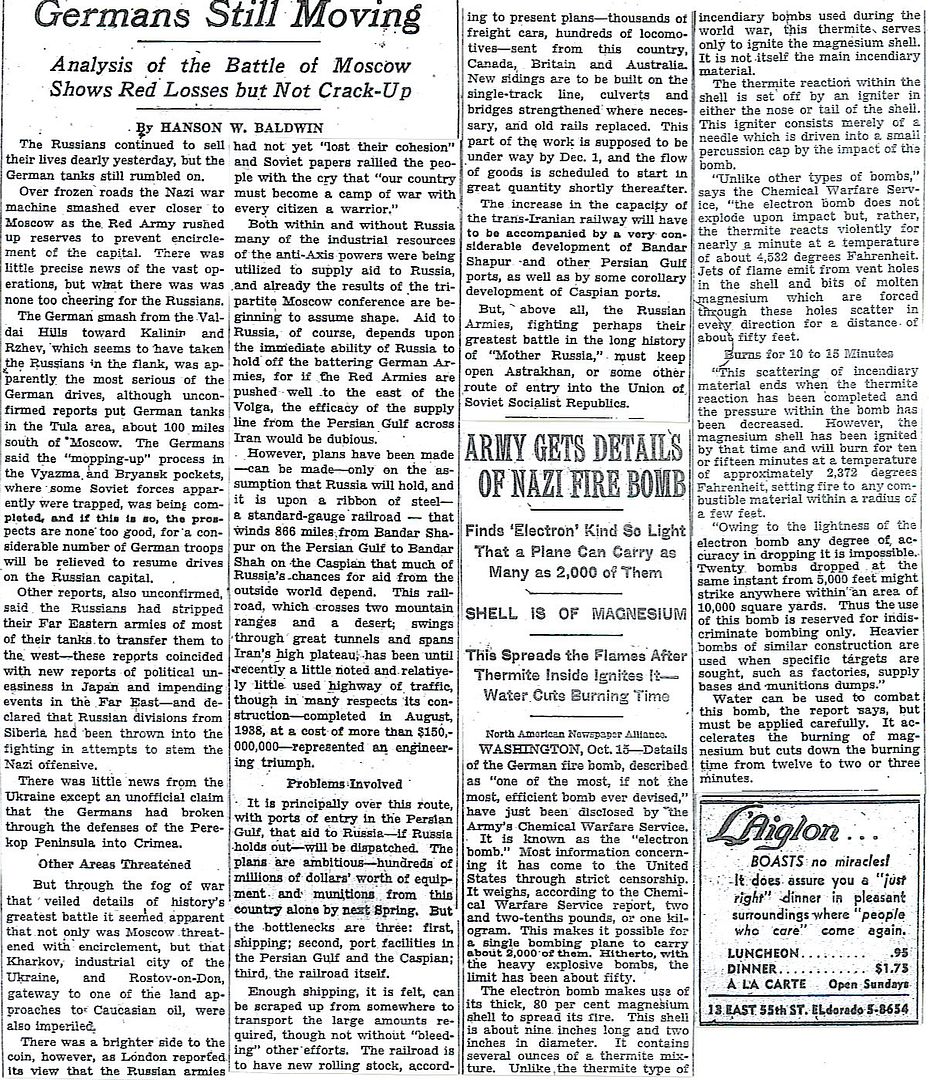
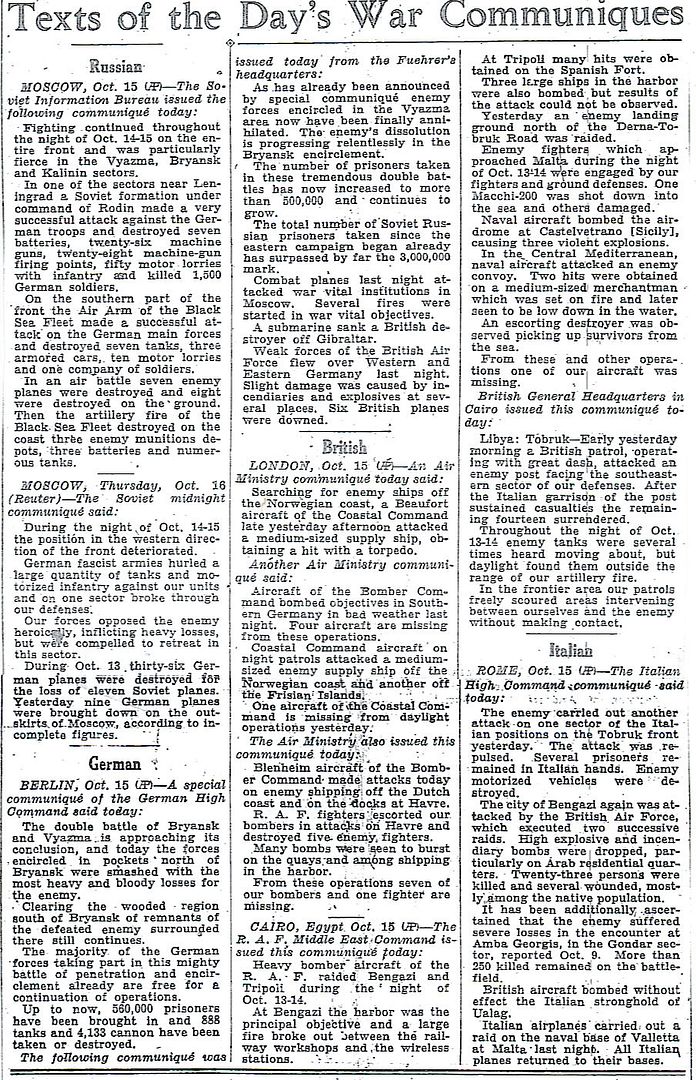
http://www.onwar.com/chrono/1941/oct41/f16oct41.htm
Tojo heads new Japanese government
Thursday, October 16, 1941 www.onwar.com
On the Eastern Front... In Moscow, the rapid German advances toward the capital lead to an exodus of foreign diplomats and government staff to Kuibyshev.
In Japan... Prime Minister Konoye resigns. War Minister Tojo replaces him assuming the offices of not only Prime Minister, but also War Minister and Home Affairs Minister. Shigenori Togo is named Foreign Minister and Admiral Shimada, Navy Minister. This Cabinet is judged to have a pro-war stance.
In Vichy France... Former Prime Ministers, Daladier, Reynaud and Blum are all arrested on Marshal Petain’s orders to face charges that they are responsible for the defeat of France.
In the North Atlantic... German U-boat U-568 hits the US destroyer Kearny with a torpedo during a convoy battle. There are 11 dead on the Kearny.
Corporal Heinrich Weseloh and Private Jan Meyer of the 2nd Battalion, 16th Infantry Regiment, 22nd Infantry Division, ran forward, doubled over and finally arrived at the jumping-off point for the attack.
The evening of 17th October 1941 was settling over the Sivash, the salt swamp separating the Crimea from the mainland. The crater-pitted ground at Perekop and the houses of Ishun looked ghostly in the falling dusk.
It was cold, and there was a freezing rain in the air.
To the right of the two infantrymen a forward artillery observer was on his knees, digging himself a foxhole for the night.
To the left of them were the men of their own unit, also digging. Weseloh and Meyer likewise dropped down on the cold ground and began to dig a hole to give them some cover for the night.
Their trenching-tools clanged softly as they struck the ground. The hollow was getting deeper. They pressed themselves into it.
"They say down on the coast it's still quite warm at this time of year," said Weseloh.
Jan Meyer nodded. He thought of his farm back home in Hanover and cursed: "This damned war!"
"Can't go on much longer," Weseloh comforted him. "A fortnight ago, up in the steppes, we took nearly 100,000 prisoners. Three weeks ago, at Kiev, 665,000 were taken, and a little while earlier, at Uman, another 100,000. They say that some 650,000 Soviets have been taken prisoner on the Central Front to date. And at Vyazma and Bryansk they seem to have had a very good bag only a few days ago —the communiqué said 663,000 prisoners. You add that up. It makes over two million."
"I'd say there are just as many Russians about as ever," Jan Meyer grunted.
Just then a Soviet IL-15 fighter swept over their positions, firing several rounds from its cannon.
Wreckage sailed through the air. The Soviets had complete air command down in the south. Even Major Gotthardt Handrick with his "Ace of Hearts" 77th Fighter Squadron was unable to do anything about it. The Soviets were vastly superior to him in numbers. In addition to ground-attack aircraft and fighter bombers they had two formations of 200 IL-15 and IL-16 fighters permanently in action. For the first time the German troops were forced to make extensive use of their trenching-tools.
Dig in—that was the first and most important commandment in the battle for the Crimea.
On the entirely bare ground of the Ishun salt steppe there was no other cover than a hole in the earth. And where the Red Air Force did not strike, the Soviet artillery did. It was established in superbly camouflaged emplacements, frequently protected by reinforced concrete and armor-plating; it was fully ranged on a number of well-chosen target points and would put down sudden concentrated heavy barrages. The German artillery found it difficult to get the Russian batteries. In these circumstances the only protection was a well-dug foxhole. And not only for the infantry: every vehicle, every gun, every horse, had likewise to be hidden several feet deep below the surface.
Night lay over Ishun—the night of 17th/18th October. In their positions between the Black Sea and the salt swamps the infantry were waiting for the dawn. The Soviets also were waiting. They knew what was going to happen and were feverishly organizing the defense of the vital peninsula. Two days earlier, on 16th October, Stalin had evacuated Odessa, which had been encircled by the Rumanian Fourth Army since early August. Major-General Y. E. Petrov's coastal Army was to help defend the Crimea.
By means of hurriedly improvised naval transports Petrov's coastal Army was to be switched to Sevastopol. It was a correct move. For if Manstein succeeded in getting into the Crimea, Odessa would have lost its importance as a port and naval base on the Black Sea anyway. It was more important to hold the Crimea and, above all, Sevastopol. The quick withdrawal by sea of an entire Army from Odessa was a bold operation which few people would have expected the Soviet Union to pull off, inexperienced as it was in naval warfare.
Aboard thirty-seven large transports totaling 191,400 GRT and on a variety of large and small naval vessels the bulk of the coastal Army, some 70,000 to 80,000 troops, were embarked in a single night and, unspotted by the German Luftwaffe, shipped to Sevastopol.
Admittedly, only the men were evacuated from Odessa. Horses and motor vehicles had to be left behind. The heavy guns were dumped in the harbor because there were no loading-cranes. The Soviet 57th Artillery Regiment went on board without a single gun, without a single vehicle, and without a single piece of equipment.
Petrov's forces were then sent into action on the Ishun front in forced marches, just as they had arrived at Sevastopol —ragged and quite inadequately equipped.
For his thrusts across the isthmus Manstein had lined up three divisions of LIV Army Corps. Indeed, there was no room for more formations in the four-mile-wide corridor.
Reading from left to right, they were the 22nd, 73rd, and 46th Infantry Divisions and parts of 170th Infantry Division.
Behind them stood XXX Corps with the 72nd, the bulk of the 170th, and the 50th Infantry Divisions. Still on the road, but later to follow the attacking Corps of Eleventh Army, was the XLII Corps with 132nd and 24th Infantry Divisions.
The Fuehrer's Headquarters had made this Corps available to Manstein on condition that its divisions were moved across into the Kuban area from Kerch as quickly as possible, to advance to the Caucasus.
Manstein's six divisions were opposed by eight field divisions of the Soviet Fifty-first Army; to these must be added four cavalry divisions, as well as the fortress troops and naval brigades in Sevastopol. Moving towards the front were General Petrov's units from Odessa.
It seemed as if the night would never end.
The forward observers were lying behind their trench telescopes. The riflemen were crouched in their two-men foxholes, pressed close together, shivering. Immediately behind the most forward infantry positions were the guns of the medium artillery and the smoke mortars which were to be used here for the first time in the sector of Eleventh Army. They were hidden by earth ramparts and camouflage netting. In position farther back was the heavy artillery with its 15- and 21-cm. guns.
At 0500 hours a gigantic thunder-clap rent the grey dawn. The battle for the Crimea was opening with a tremendous artillery bombardment from every gun in Eleventh Army.
It was an inferno of crashing noise, flashes of fire, fountains of mud, smoke, and stench. With a roar and a scream the smoke mortar rockets with their fiery tails streaked towards the enemy positions, showering the defenders of the isthmus of Ishun with a hail of iron and fire.
The time was 0530.
The inferno was only 100 yards in front of the positions of the assault regiment. For a moment the barrage was silent. Then it started again, but this time the shellbursts were farther away: the guns had lengthened their range.
That was the signal for the infantry.
The men scrambled out of their earth-holes. "Forward!" They charged. Machineguns gave them covering fire. Mortars were keeping enemy strongpoints quiet.
But the German artillery bombardment had not put the Soviets out of action in their long and carefully prepared positions. Russian machine-guns opened up. Soviet artillery fired well-aimed salvos and time and again forced the attackers to take cover.
Only step by step could the charging infantrymen gain ground. On the left wing Colonel Haccius of the 22nd Infantry Division from Lower Saxony made a penetration in the enemy lines with his battalions of 65th Infantry Regiment and seized the fortified ridge of high ground which blocked the passage. But heavy enemy gunfire forced them to dig in.
Things went less well in the sector of 47th Infantry Regiment. The assault companies got stuck in front of a powerful wire obstacle and were shot up by the Soviets. Those who were not killed worked their way back. The 16th Infantry Regiment, 22nd Infantry Division, had to be brought up from reserve positions; it made a flanking attack and rolled up the Soviet defenses in front of 47th Infantry Division.
The advance was resumed.
The so-called Heroes Tumulus of Assis, a commanding earth mound in an otherwise completely flat terrain, was stormed by men of 47th Infantry Regiment. But the Russians did not surrender. They died in their foxholes and trenches.
In the sector of 73rd Infantry Division, on the right of 22nd Infantry Division, the regiments also gradually gained ground.
And on the right wing units of 46th and 170th Infantry Divisions worked their way into the strongly fortified system of Soviet defenses. But these deeply staggered defenses seemed to have no end to them—wire obstacles and more wire obstacles, thick minefields with wooden box mines which did not respond to the sappers' detectors, as well as emplaced and remote controlled flame-throwers. Moreover, buried tanks and even electrically detonated seamines completed these "devil's plantations" which the gallant sappers had to weed.
Field position after field position had to be taken by the infantry in costly fighting through these mile-deep defenses. Frequently the situation was saved only by the assault artillery employed in support of the infantry: the lumbering monsters of the Self-propelled Gun Battalion 190 breached the wire obstacles and pillbox lines for the infantry companies. The battle raged for eight days—eight times twenty-four hours. At last the entrance to the Crimea was forced at several points. Even Petrov's coastal Army had been unable to prevent this. According to Colonel P. A. Zhilin, that Army lost most of its men and equipment during the last three days of the fighting for the isthmus. Zhilin ascribed these heavy casualties to "massed German tank attacks." He is mistaken.
Manstein had no tank formations at all. They were Major Vogt's two dozen self-propelled guns of Battalion 190—known as the Lions after their tactical sign—which, together with 170th Infantry Division, decisively smashed General Petrov's coastal Army.
At the same time Eleventh Army command could not help noticing that the battle strength of its own assault formations had begun to decline during these days of heavy fighting. The 25th and 26th October, in particular, had seen many crises. And on 27th October there had been some fierce engagements with Petrov's Odessa regiments before the Soviet resistance weakened.
Manstein therefore fixed 28th October as the date for the final breakthrough strike.
But this blow did not connect: the Soviet Fifty-first Army had abandoned its positions under cover of darkness and withdrawn to the east. The remnants of Petrov's Coastal Army were streaming south in disorder, in the direction of Sevastopol. The German breakthrough into the Crimea had come off.
To Be Continued-Pursuit and Destruction in The Crimea.
Since when did Free Republic become the “History Channel”?
Not this question again.....
It is still Free Republic. Events of the past are relevant to today's current events, wouldn't you say? By the way, some of the articles contained in these posts generate really interesting discussions about the U.S. Army. Do you find that worthwhile?
Thank you for your service, Old Retired Army Guy.
History has been largely written by the left and since before you showed up, Freepers have been attempting to set the historic record straight.
It’s always been history oriented.
Perhaps you should consider skipping this thread, if it irks you so much, and concentrate on threads that please you more.
It appears you are developing a memory problem. I recommend you get that checked out. While some memory loss is common with age, it could also be the first signs of Alzheimer’s disease. This is very treatable if caught early (though not curable) so really go see your doctor.
"Women and children lost their lives as victims of mass executions.
This photograph shows a mother and her two children, as well as several hundred others, just before the mass shooting at Lubny, Ukraine, on October 16, 1941."
It’s not just the foreign diplomats fleeing to Kubiyshev. Today is the “great skedaddle;” the day a lot of Party apparatchiks fled, too. The news of the fall of Kalinin on October 14, coupled with the news of the fall of Orel a few days ago, has set the population in a state of panic. The rail stations are jammed with people trying to flee to the east.
Today is the closest the Soviet regime will come to an internal collapse since 1917, and it will not happen again until 1991. Also, from this point forward, there will be an unspoken difference in opinion between those who stayed and gutted it out, and those who left. The ones who stayed will look with contempt on those who left.
http://homepage.ntlworld.com/andrew.etherington/month/thismonth/16.htm
October 16th, 1941
UNITED KINGDOM: Destroyer HMS Chiddingfold commissioned. (Dave Shirlaw)
FRANCE: Marshal Petain orders the arrest of Daladier, Reynaud, Mandel and Blum, former Prime Ministers of France, together with General Gamelin. They are charged with the French defeat.
GERMANY:
U-638 laid down.
U-600 launched.
U-160, U-592, U-703 commissioned. (Dave Shirlaw)
U.S.S.R.: Moscow: Over half a million men, women and children complete building new defences around the city - 5,000 miles of trenches, 60 miles of anti-tank ditches and 177 miles of barbed wire.
Molotov has told the foreign embassies that they are to be evacuated to Kuybishev. The streets are full of charred paper as secret documents are burnt. Party members are tearing up their cards. Pictures of Stalin are being taken down.
There is panic in the air as rumours spread that German tanks are in the suburbs. There is no transport; the buses and taxis have been commandeered to take troops to the front. Some officials and policemen, fearful of what will happen to them if the Germans arrive, are fleeing the city, and looters are taking advantage of their departure. General Zhukov, recalled from Leningrad, is working feverishly to organize a new line of defence. He has ordered the setting up of artillery and anti-tank strongpoint to ambush the German Panzers on their approach routes.
Reinforcements are being rushed to Moscow from other sector. Workers battalions, armed by Moscow’s own factories, are taking their places in the front line. In the midst of all this feverish activity, the Associated Press correspondent has been asked to write a story on Lenin’s tomb. He had time to send one message - “Tomb closed” - before he joined the exodus to Kuybishev.
The Romanian and Germans who have been besieging the Black Sea port of Odessa since August finally marched into the city only to find it empty and burning.
Its defenders had sailed for Sevastopol during the night in a secret evacuation involving 30 ships and 35,000 men. The rearguard was taken on board at 4am. The last man to leave was Captain Makarenko, the commander of the port.
Most of the garrison and party officials had already been evacuated, along with several thousand prisoners. All the material that had to be left behind was burnt. The big guns of the 95th Rifle Division were dumped into the harbour.
The Romanians, after suffering 98,000 casualties in the siege, are making the most of the Soviet withdrawal: “Troops of our Fourth Army marched into Odessa this afternoon. The last nests of resistance are being cleared up in street fighting. The population greeted German and Romanian forces with enthusiasm.” (Michael F. Yaklich)
SPAIN: U-204 entered the Spanish harbour of Cadiz to take on supplies from the German tanker Thalia. (Dave Shirlaw)
JAPAN: Prime Minister Konoye resigns, following Roosevelt’s refusal to grant him a summit meeting and division in the Japanese cabinet over negotiation with the USA. General Tojo Heidiki (Japanese order) will tomorrow be appointed Prime Minister, War Minister and Home Affairs Minister. In Prince Konoye’s cabinet he had been War Minister. Although the decision to go to war has not been finally taken, these changes show the rise of those wishing to go to war. (Tim Lanzendörfer)
U.S.A.: The Chief of Naval Operations sends the following message to the fleet commanders: “The resignation of the Japanese Cabinet has created a grave situation X If a new Cabinet is formed it will probably be strongly nationalistic and anti American X If the Konoye Cabinet remains the effect will be that it will operate under a new mandate which will not include rapprochement with the US X In either case hostilities between Japan and Russia are a strong possibility X Since the US and Britain are held responsible by Japan for her present desperate situation there is also a possibility that Japan may attack these two powers X In view of these possibilities you will take due precautions including such preparatory deployments as will not disclose strategic intention nor constitute provocative actions against Japan X Second and third addressees (in the Pacific) inform appropriate Army and Naval district authorities X Acknowledge XX (John Nicholas and Jack McKillop)
Stimson asks State Department to arrange with Australians for use of airfields in New Guinea, New Britain, and Australia itself.
ATLANTIC OCEAN: The battle to protect convoy SC 48 continues. German submarines U-502 and U-568 re-establish contact before retiring upon arrival of the USN’s Task Unit 4.1.4 (Captain Hewlett Thebaud). Destroyer USS Livermore (DD-429) sweeps ahead of the convoy, and depth-charges U-553; destroyer USS Kearny (DD-432), sweeping astern, drops charges to discourage tracking submarines. Later, U-502 and U-568, augmented by U-432, U-553, and U-558 renew attack upon SC 48. The U-boats commence a determined assault on SC 48 during the night of 16-17 October. (John Nicholas and Jack McKillop)
Flower class corvette HMS Gladiolus disappears. Early the following morning a very loud explosion is heard behind the convoy, which may have, been Gladiolus following an attack by U-568, but there is no conclusive evidence of this loss, or any survivors. Possible location Atlantic, 67N 25W. (Alex Gordon)(108)
U-568 sank SS Empire Heron in Convoy SC-48. (Dave Shirlaw)
http://homepage.ntlworld.com/andrew.etherington/month/thismonth/16.htm
October 16th, 1941
UNITED KINGDOM: Destroyer HMS Chiddingfold commissioned. (Dave Shirlaw)
FRANCE: Marshal Petain orders the arrest of Daladier, Reynaud, Mandel and Blum, former Prime Ministers of France, together with General Gamelin. They are charged with the French defeat.
GERMANY:
U-638 laid down.
U-600 launched.
U-160, U-592, U-703 commissioned. (Dave Shirlaw)
U.S.S.R.: Moscow: Over half a million men, women and children complete building new defences around the city - 5,000 miles of trenches, 60 miles of anti-tank ditches and 177 miles of barbed wire.
Molotov has told the foreign embassies that they are to be evacuated to Kuybishev. The streets are full of charred paper as secret documents are burnt. Party members are tearing up their cards. Pictures of Stalin are being taken down.
There is panic in the air as rumours spread that German tanks are in the suburbs. There is no transport; the buses and taxis have been commandeered to take troops to the front. Some officials and policemen, fearful of what will happen to them if the Germans arrive, are fleeing the city, and looters are taking advantage of their departure. General Zhukov, recalled from Leningrad, is working feverishly to organize a new line of defence. He has ordered the setting up of artillery and anti-tank strongpoint to ambush the German Panzers on their approach routes.
Reinforcements are being rushed to Moscow from other sector. Workers battalions, armed by Moscow’s own factories, are taking their places in the front line. In the midst of all this feverish activity, the Associated Press correspondent has been asked to write a story on Lenin’s tomb. He had time to send one message - “Tomb closed” - before he joined the exodus to Kuybishev.
The Romanian and Germans who have been besieging the Black Sea port of Odessa since August finally marched into the city only to find it empty and burning.
Its defenders had sailed for Sevastopol during the night in a secret evacuation involving 30 ships and 35,000 men. The rearguard was taken on board at 4am. The last man to leave was Captain Makarenko, the commander of the port.
Most of the garrison and party officials had already been evacuated, along with several thousand prisoners. All the material that had to be left behind was burnt. The big guns of the 95th Rifle Division were dumped into the harbour.
The Romanians, after suffering 98,000 casualties in the siege, are making the most of the Soviet withdrawal: “Troops of our Fourth Army marched into Odessa this afternoon. The last nests of resistance are being cleared up in street fighting. The population greeted German and Romanian forces with enthusiasm.” (Michael F. Yaklich)
SPAIN: U-204 entered the Spanish harbour of Cadiz to take on supplies from the German tanker Thalia. (Dave Shirlaw)
JAPAN: Prime Minister Konoye resigns, following Roosevelt’s refusal to grant him a summit meeting and division in the Japanese cabinet over negotiation with the USA. General Tojo Heidiki (Japanese order) will tomorrow be appointed Prime Minister, War Minister and Home Affairs Minister. In Prince Konoye’s cabinet he had been War Minister. Although the decision to go to war has not been finally taken, these changes show the rise of those wishing to go to war. (Tim Lanzendörfer)
U.S.A.: The Chief of Naval Operations sends the following message to the fleet commanders: “The resignation of the Japanese Cabinet has created a grave situation X If a new Cabinet is formed it will probably be strongly nationalistic and anti American X If the Konoye Cabinet remains the effect will be that it will operate under a new mandate which will not include rapprochement with the US X In either case hostilities between Japan and Russia are a strong possibility X Since the US and Britain are held responsible by Japan for her present desperate situation there is also a possibility that Japan may attack these two powers X In view of these possibilities you will take due precautions including such preparatory deployments as will not disclose strategic intention nor constitute provocative actions against Japan X Second and third addressees (in the Pacific) inform appropriate Army and Naval district authorities X Acknowledge XX (John Nicholas and Jack McKillop)
Stimson asks State Department to arrange with Australians for use of airfields in New Guinea, New Britain, and Australia itself.
ATLANTIC OCEAN: The battle to protect convoy SC 48 continues. German submarines U-502 and U-568 re-establish contact before retiring upon arrival of the USN’s Task Unit 4.1.4 (Captain Hewlett Thebaud). Destroyer USS Livermore (DD-429) sweeps ahead of the convoy, and depth-charges U-553; destroyer USS Kearny (DD-432), sweeping astern, drops charges to discourage tracking submarines. Later, U-502 and U-568, augmented by U-432, U-553, and U-558 renew attack upon SC 48. The U-boats commence a determined assault on SC 48 during the night of 16-17 October. (John Nicholas and Jack McKillop)
Flower class corvette HMS Gladiolus disappears. Early the following morning a very loud explosion is heard behind the convoy, which may have, been Gladiolus following an attack by U-568, but there is no conclusive evidence of this loss, or any survivors. Possible location Atlantic, 67N 25W. (Alex Gordon)(108)
U-568 sank SS Empire Heron in Convoy SC-48. (Dave Shirlaw)
Disclaimer: Opinions posted on Free Republic are those of the individual posters and do not necessarily represent the opinion of Free Republic or its management. All materials posted herein are protected by copyright law and the exemption for fair use of copyrighted works.